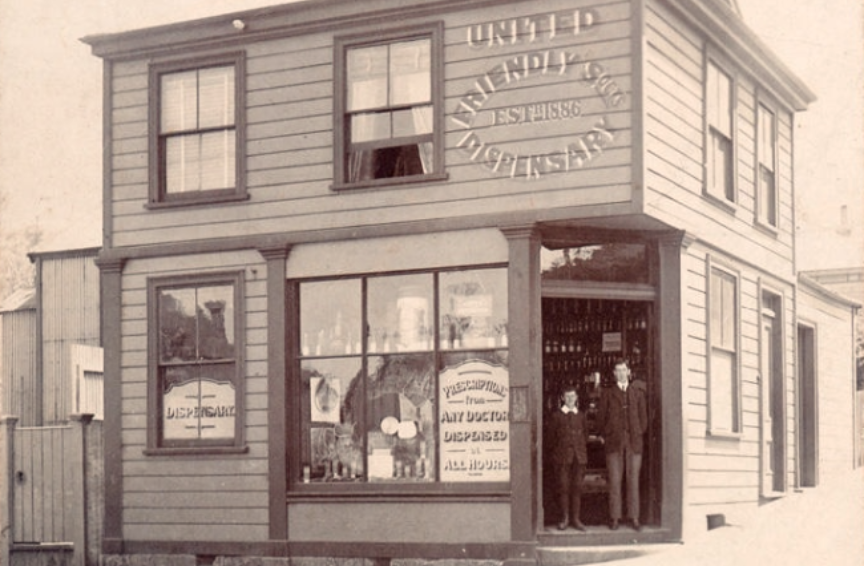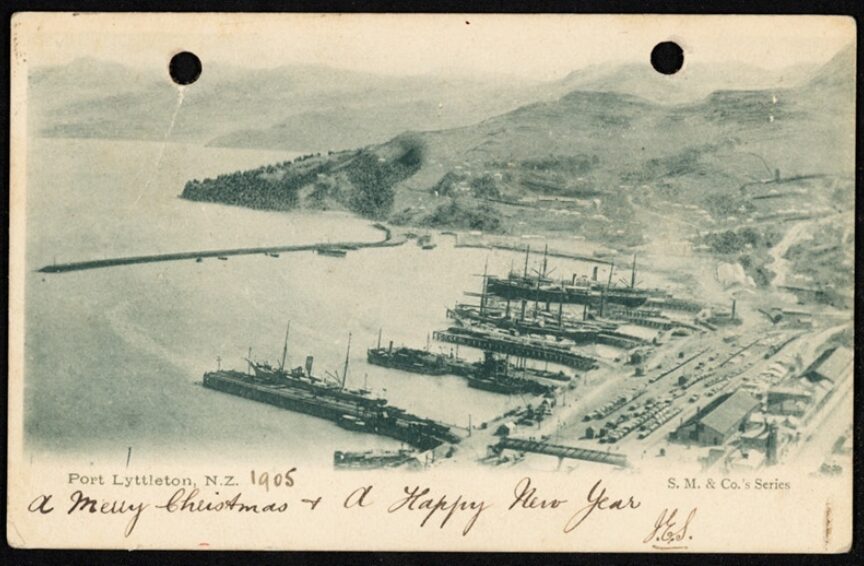PO Box 95
Lyttelton 8841
Te Ūaka recognises Te Hapū o Ngāti Wheke as Mana Whenua and Mana Moana for Te Whakaraupō / Lyttelton Harbour.
The Lyttelton Marine Band
On the night of 19th February 1902, the Lyttelton Marine Band, friends, and supporters gathered in the Naval Artillery Orderly Room for a ‘Smoke Concert’. A strictly mens-only concern, much tobacco and aperitifs were consumed with the musical accompaniment and toasts to the King, the Governor and his Parliament, and the brave Volunteers of the Lyttelton Naval Corps! Founding bandmaster Mr George E. Collins was also well toasted before presenting the Drum-Major Mr W. Toomey with the gold medal the band won at the recent Christchurch marching competition. Mr Collins was then himself presented with a ‘silver-mounted travelling bag’ by the assembled band members in appreciation of his good works in getting the band up to a national standard of practice. George Collins would go on to lead the Lyttelton Marine in taking a very respectable 4th place in the 1903 New Zealand National Championships (A Grade) that were held that year in Timaru.
The Lyttelton Garrison Band had formed from the Garrison Artillery manning the Battery Point barracks and gun emplacements around 1886 under the direction of Mr D. M’Killop. Bandmaster M’Killop had been involved earlier with the civilian Lyttelton Town Band that had formed around 1871. The Lyttelton Marine Band, in 'Navals' uniforms, formed in 1897 under bandmaster Collins and incorporated members of the Garrison Band that carried on playing through to around 1911 before fading into local history. In the years before WW1 the Lyttelton Marine Band would continue to delight audiences in and around Canterbury under the steady hands of conductors Mr J. Cummins and then Mr W. S. King.
The 1910 Lyttelton Marines took 4th place in the New Zealand National Championships (A Grade) playing Wagner at His Majesty’s Theatre in Dunedin. Two years later the Lyttelton Marine easily overcame rivals Oamaru Regimental to take out first prize in the 1912 New Zealand National Championships (B Grade) performing Rossini in front of a local audience at the Christchurch Showgrounds. Then in October of that same year they took 3rd prize in the A Grade Championships at the Caledonian Grounds in Dunedin with Puccini’s Madame Butterfly!
After a break during WW1 the Lyttelton Marine Band reformed and in 1925 performed for the 75th anniversary of the 1850 arrival of the first four ships carrying the Canterbury Association’s settlers – as pictured here in our second photograph and including band members Messrs. Demicelli and Claude Plimmer. The band would continue on playing for some decades to come, being a fixture at town events such as the 1932 Lyttelton Harbour Festival of Lights, before reforming yet again after WW2 in 1946 with its long serving bandmaster Mr F. J. Oakley at the helm.
The Lyttelton Marine Band marched on valiantly through the 50s until their last known performance in the National Championships on Monday 7th March 1960. In front of a home crowd at Lancaster Park, Christchurch, conducted by Oakley, the Lyttelton Marine came in at 11th place in the D Grade Quickstep March of the New Zealand National Championships, and well behind the first placed Upper Hutt Municipal Band.
Following this denouement, the Lyttelton Marine continued playing on the regional stage and included a junior band with Graham Rich conducting, with the juniors continuing after the senior band went into recess in 1968. Bob Hopkins conducted the junior band from 1971 to 1973 at which point it also went into recess. Finally, Stan Carson reformed the Lyttelton Marine Band and remained conductor through to 1980 when the band’s assets were vested with the Lyttelton Borough Council. After the council mergers and a number of years, the band’s music library and musical instruments were purchased by the New Brighton Silver Band.
The glory days of the Lyttelton Marine Band and its Smoke Concerts are now long gone, as is the band itself, but its spirit lives on in the still very musical port town it proudly represented for so many decades.
Many thanks to Philip Melville Paulsen for his information about the activities of the 1960-80s era band.

